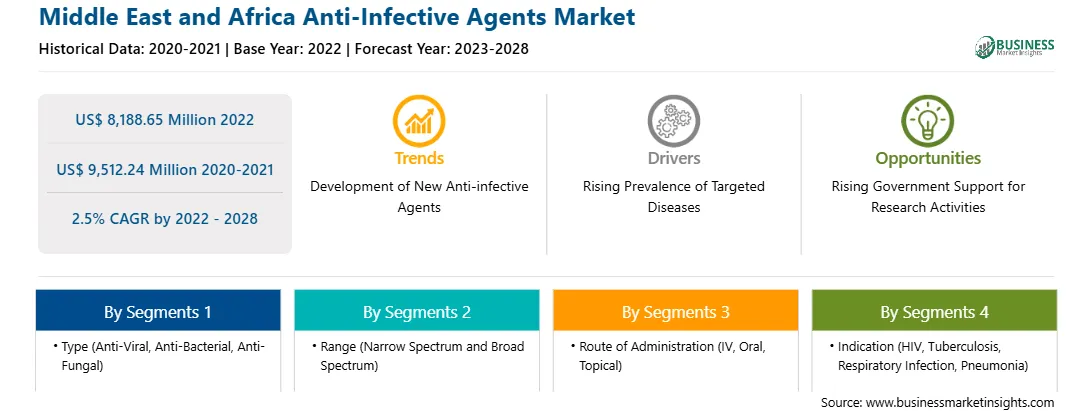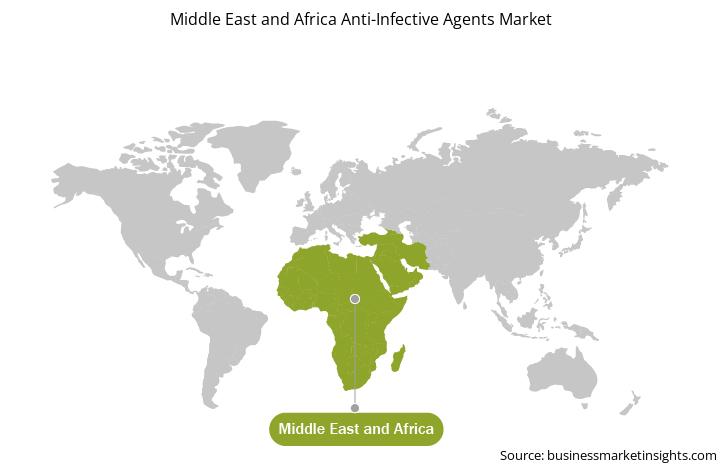The MEA Anti-infective agents market was valued at US$ 8,188.65 million in 2022 and is projected to reach US$ 9,512.24 million by 2028.
It is expected to grow at a CAGR of 2.5% during the forecast period.
Rising investments in R&D activities in the pharmaceutical sector is the major factor driving the growth of the Middle East & Africa anti-infective agents market. Anti-infective discovery strategies are currently concentrated on two approaches: The development of antibiotic adjuvants for combined therapy with the existing antibiotics in clinical use and the discovery of small molecules with new mechanisms of action that can disable unexplored objectives for bacterial survival. A few of the novel approaches used primarily focused on improving existing drugs. Gram-negative ESKAPE pathogens, such as Pseudomonas aeruginosa and Enterobacteriaceae, which the WHO named in 2017 as the top priority pathogens for developing novel anti-infective therapies, are known for causing multi-resistant healthcare-associated infections. Nevertheless, despite the difficulties and the expense, the creation of chemicals with novel modes of action has the potential to improve the capacity to manage microorganisms for treatments significantly. The anticipated revenue from a new drug, the anticipated development costs, and laws that affect drug supply and demand all have a role in determining how much money pharmaceutical companies invest in research and development.
The increasing investment in the pharmaceutical industry is boosting the demand for anti-infective agents. Therefore, the increasing investment in the pharmaceutical industry is expected to contribute significantly to the anti-infective agents market during the forecast period.
Vendors can attract new customers and expand their footprints in emerging markets with new features and technologies. This factor is likely to drive the Middle East & Africa anti-infective agents market at a good CAGR during the forecast period.
Strategic insights for the Middle East and Africa Anti-Infective Agents provides data-driven analysis of the industry landscape, including current trends, key players, and regional nuances. These insights offer actionable recommendations, enabling readers to differentiate themselves from competitors by identifying untapped segments or developing unique value propositions. Leveraging data analytics, these insights help industry players anticipate the market shifts, whether investors, manufacturers, or other stakeholders. A future-oriented perspective is essential, helping stakeholders anticipate market shifts and position themselves for long-term success in this dynamic region. Ultimately, effective strategic insights empower readers to make informed decisions that drive profitability and achieve their business objectives within the market. The geographic scope of the Middle East and Africa Anti-Infective Agents refers to the specific areas in which a business operates and competes. Understanding local distinctions, such as diverse consumer preferences (e.g., demand for specific plug types or battery backup durations), varying economic conditions, and regulatory environments, is crucial for tailoring strategies to specific markets. Businesses can expand their reach by identifying underserved areas or adapting their offerings to meet local demands. A clear market focus allows for more effective resource allocation, targeted marketing campaigns, and better positioning against local competitors, ultimately driving growth in those targeted areas.Middle East and Africa Anti-Infective Agents Strategic Insights

Middle East and Africa Anti-Infective Agents Report Scope
Report Attribute
Details
Market size in 2022
US$ 8,188.65 Million
Market Size by 2028
US$ 9,512.24 Million
Global CAGR (2022 - 2028)
2.5%
Historical Data
2020-2021
Forecast period
2023-2028
Segments Covered
By Type
By Range
By Route of Administration
By Indication
By Distribution Channel
Regions and Countries Covered
Middle East and Africa
Market leaders and key company profiles
Middle East and Africa Anti-Infective Agents Regional Insights

The Middle East & Africa anti-infective agents market is segmented based on type, range, route of administration, indication, distribution channel, and country. Based on type, the market is segmented into anti-bacterial, anti-viral, anti-fungal, and others. The anti-viral segment is expected to account for the largest market share by the end of 2022.
Based on range, the market is segmented into broad spectrum and narrow spectrum. By the end of 2022, the narrow spectrum segment will likely hold a larger market share.
Based on route of administration, the market is segmented into topical, oral, IV, and others. By the end of 2022, the IV segment is likely to hold the largest market share.
Based on indication, the market is segmented into HIV, tuberculosis, respiratory infection, pneumonia, and others. In 2022, the others segment is projected to hold the largest share of the market.
Based on distribution channel, the market is segmented into hospital pharmacies, specialty pharmacies, e-commerce, and others. By the end of 2022, the hospital pharmacies segment is likely to hold the largest market share.
Based on country, the market is segmented into Saudi Arabia, South Africa, the UAE, and the Rest of the Middle East & Africa. The Rest of the MEA is expected to hold the largest market share by the end of 2022.
Abbott; Allergan Plc.; Astellas Pharma Inc.; Bayer AG; Boehringer Ingelheim International GmbH; Bristol-Myers Squibb Company; F. Hoffmann-La Roche Ltd.; Gilead Sciences, Inc.; GlaxoSmithKline plc.; Merck & Co., Inc.; and Novartis AG are the leading companies in the Middle East & Africa anti-infective agents market.
The Middle East and Africa Anti-Infective Agents Market is valued at US$ 8,188.65 Million in 2022, it is projected to reach US$ 9,512.24 Million by 2028.
As per our report Middle East and Africa Anti-Infective Agents Market, the market size is valued at US$ 8,188.65 Million in 2022, projecting it to reach US$ 9,512.24 Million by 2028. This translates to a CAGR of approximately 2.5% during the forecast period.
The Middle East and Africa Anti-Infective Agents Market report typically cover these key segments-
The historic period, base year, and forecast period can vary slightly depending on the specific market research report. However, for the Middle East and Africa Anti-Infective Agents Market report:
The Middle East and Africa Anti-Infective Agents Market is populated by several key players, each contributing to its growth and innovation. Some of the major players include:
The Middle East and Africa Anti-Infective Agents Market report is valuable for diverse stakeholders, including:
Essentially, anyone involved in or considering involvement in the Middle East and Africa Anti-Infective Agents Market value chain can benefit from the information contained in a comprehensive market report.